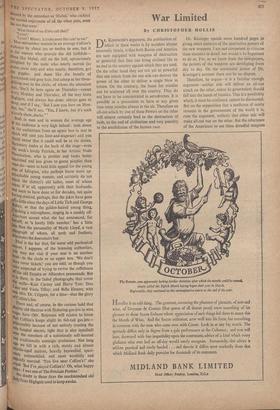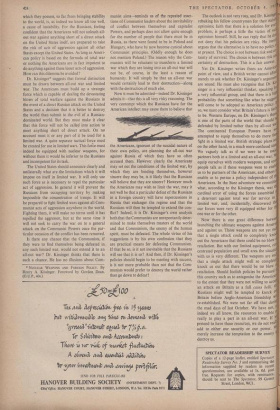War Limited
By CHRISTOPHER HOLLIS
DR. KISSINGER'S argument, the publication of which in these weeks is by accident almost uncannily timely, is that both Russia and America are now equipped with weapons of destruction so powerful that they can bring civilised life to an end in the country against which they are used. On the other hand they are not yet so powerful that one attack from the one side can destroy the power of the other to deliver a single blow in return. On the contrary, the bases for missiles can be scattered all over the country. They do not have to be concentrated in aerodromes. It is possible as a precaution to have at any given time some missiles always in the air. Therefore an all-out attack by one of these Powers on the other will almost certainly lead to the destruction of both, to the end of civilisation and very possibly to the annihilation of the human race.
Dr. Kissinger spends some hundred pages in giving exact statistics of the destructive powers of the new weapons. I am not competent to criticise these statistics in detail, nor would it be important to do so. For, as we know from the newspapers, the powers of the weapons are developing from day to day. On the substantial justice of Dr. Kissinger's account there can be no dispute.
Therefore, he argues—it is a familiar enough argument—neither side will deliver an all-out attack on the other, unless its government should fall into the hands of lunatics. That is a possibility which, it must be confessed, cannot be discounted. But on the supposition that a modicum of sanity remains in the governments of the world it is, runs the argument, unlikely that either side will make all-out war on the other. But the reluctance of the Americans to use these dreadful weapons which they possess, so far from bringing stability to the world, is, as indeed we know all too well, a cause of instability. For the Russians, feeling confident that the Americans will not unleash all- out war against anything short of a direct attack on the United States itself, are prepared to take the risk of acts of aggression against all other States except the United States. As long as Ameri- can policy is based on the formula of total war or nothing the Americans are in fact impotent to do anything against these lesser acts of aggression. How can this dilemma be avoided?
Dr. Kissinger* suggests that formal distinction must be drawn between all-out war and limited war. The Americans must build up a strategic force which is capable of dealing the devastating blows of total warfare against the Russians in the event of a direct Russian attack on the United States and a decision that it is better to destroy the world than submit to the evil of a Russian- dominated world. But they must make it clear that this force will not be called into action to meet anything short of direct attack. On no account must it or any part of it be used for a limited war. A quite separate tactical force must be created for use in limited wars. This foie must indeed be equipped with nuclear weapons, for without them it would be inferior to the Russians and incompetent for its task.
The United States should announce clearly and unilaterally what are the limitations which it will impose on itself in limited war. It will only use such force as is necessary to repel the particular act of aggression. In general it will prevent the Russians from occupying territory by making impossible the concentration of troops. It will be prepared to fight limited wars against all Com- munist acts of aggression anywhere in the world. Fighting them, it will make no terms until it has repelled the aggressor, but at the same time it will not seek to carry the war on to a general attack on the Communist Powers once the par- ticular occasion of the conflict has been removed.
Is there any chance that the Communists, if they were to find themselves being defeated in any such limited war, would not extend it to an all-out war? Dr. Kissinger thinks that there is such a chance. He has no illusions about Corn- * NUCLEAR WEAPONS AND FOREIGN POLICY. By Henry A. Kissinger. Foreword by Gordon Dean. (0.U.P., 40s.) munist aims—reminds us of the repeated asser- tions of Communist leaders about the inevitability of conflict between themselves and capitalist Powers, and perhaps does not allow quite enough for the number of people that there must be in Russia, as there were found to be in Poland and Hungary, who have by now become cynical about Communist principles. (Oddly enough he does not mention Poland.) The reason why the Com- munists will be reluctant to transform a limited war which they are losing into an all-out war will not be, of course, in the least a reason of humanity. It will simply be that an all-out war would certainly lead to their destruction—along with the destruction of much else.
Now it must be admitted—indeed Dr. Kissinger admits it—that this is all very risky reasoning. The very contempt which the Russians have for the American intellect may cause them to believe that the Americans, ignorant of the suicidal nature of their own policy, are planning the all-out war against Russia of which they have so often accused them. However clearly the Americans may set out the conditions of the limited war, by which they are binding themselves, however sincere they may be, is it likely that the Russians will believe that they are sincere? However much the Americans may wish to limit the war, may it not well be that a particular defeat of the Russians in a foreign country will have repercussions in Russia that endanger the regime and that the Russians will then be tempted to extend the con- flict? Indeed, it is Dr. Kissinger's own analysis both that the Communists are unrepentantly deter- mined to make themselves masters of the world and that Communism, the enemy of the human spirit, must be defeated. The whole virtue of his suggestions is by his own confession that they are practical means for defeating Communism. If that be so, is it not inevitable that the Russians will see that it is so? And then, if Dr. Kissinger's policies should begin to be meeting with success, is it not more probable than not that the Com- munists would prefer to destroy the world rather than go down to defeat? The outlook is not very rosy, and Dr. Kissing rebuking his fellow countrymen for their naive' optimistic faith that there is a solution for ever, problem, is perhaps a little the victim of suo optimism himself. Still, he can reply that he do6 not deny that his policies are risky. He meeell argues that the alternative is to have no policy at present. The choice is not between risk and cei: tainty of survival. The choice is between risk as° certainty of destruction. This is a fair answer.
Yet Dr. Kissinger writes from an Amelia' point of view, and a British writer cannot affer merely to ask whether Dr. Kissinger's argumes.t are sound. He must also recognise that Dr. 14.1 singer is a very influential thinker, speaking f° a very influential group, and that there is a probability that something like what he sugges; will come to be adopted as American policy. so, we must consider what Britain's future is like' to be. Western Europe, on Dr. Kissinger's thes is one of the parts of the world that should I defended by limited rather than by all-out via The continental European Powers have 0° attempted to equip themselves to do more till fight in a limited war. British strategic plans on the other hand, in a much more confused sta We vaguely talk as if we were to be mai, partners both in a limited and an all-out war..0 equip ourselves with modern -weapons, and so people talk as if those weapons were to cob us to be partners of the Americans, and others enable us to pursue a policy independent of Americans. In the Suez adventure we commit what, according to the Kissinger thesis, was cardinal error of using the forces assembled a deterrent against total war for service in limited war, and, incidentally, discovered th° our forces were very ill equipped either 'for t one war or for the other.
Now there is one great difference betwee launching the ultimate weapons against Amert and against us. Those weapons are not yet su that a single attack could so completely kilo out the Americans that there could be no blow retaliation. But with our limited equipment, e0 centrated population and small area the situan with us is very different. The weapons are suc that a single attack might well so completet knock us out that there would be no blow retaliation. Should foolish policies be pursued this country such as to antagonise the America to the extent that they were not willing to acce an attack on Britain as a full casus belli, Russians might well be tempted to knock 0 Britain before Anglo-American friendship re-established. We were not far off that dun! the mad days of last October. We have not, indeed we all know, the resources to enable really to play a part in an all-out war. If pretend to have those resources, we do not re!., add to either our security or our power. merely increase the temptation to the eneglY destroy us.























































 Previous page
Previous page